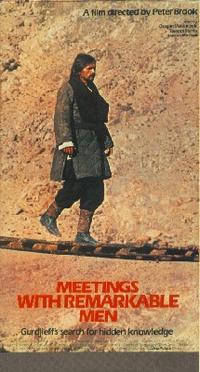| Meetings with Remarkable Men | |
|---|---|
 VHS cover | |
| Directed by | Peter Brook |
| Written by | G. I. Gurdjieff (book) Screenplay: Peter Brook, Jeanne de Salzmann |
| Produced by | Stuart Lyons |
| Starring | Dragan Maksimović, Terence Stamp |
| Cinematography | Gilbert Taylor |
| Edited by | John Jympson |
| Music by | Laurence Rosenthal |
| Distributed by | Enterprise Pictures Ltd |
Release date |
|
Running time | 89 minutes |
| Country | United Kingdom |
| Language | English |
Meetings with Remarkable Men is a 1979 British biographical drama film directed by Peter Brook [1] and based on the book of the same name by Greek-Armenian mystic, G. I. Gurdjieff, first published in English in 1963. Shot on location in Afghanistan (except for dance sequences, which were filmed in England), it starred Terence Stamp, and Dragan Maksimović as the adult Gurdjieff. The film was entered into the 29th Berlin International Film Festival, in competition for the Golden Bear award.
Contents
The plot involves Gurdjieff and his companions' search for truth in a series of dialogues and vignettes, much as in the book. Unlike the book, these result in a definite climax—Gurdjieff's initiation into the mysterious Sarmoung Brotherhood. The film is noteworthy for making public some glimpses of the Gurdjieff movements. [2]